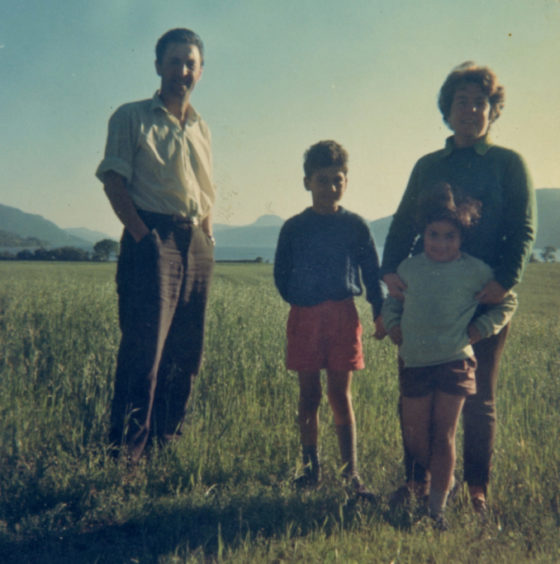
Scotland’s Makar Jackie Kay hopes poetry can help provide solace and hope in these dark, uncertain times.
The country’s national poet – whose widowed mother Helen, 89, is in a care home in Milton of Campsie where visitors are not allowed – hopes to write a poem during each week of the crisis.
Today, The Sunday Post publishes Still, the first in her series, along with the work of others poets she believes has a special resonance at this time of crisis. We will run another of Jackie’s chosen poems every week.
She said: “These are really difficult times and in difficult times people often find a way of turning instinctively towards art and literature and poetry.
“This is a wake-up call for an entire world; every cloud has a silver lining. Perhaps out of this there might come some positives. If people take to reading more, they will get something from it.
“It would be great if they had a poem a day to read, just like doctors used to recommend apples. A poem a day is good for your mental health and will help you not feel so alone. We have to find ways to nourish ourselves mentally. We need to build up our mental immune system to cope with something like this.”
Happy Mother’s Day everybody – the strangest Mother’s Day ever. Here’s a poem I wrote -which you can also see in The Sunday Post. @Sunday_Post @valmcdermid @juliehes @Whjm @andoh_adjoa @Netballsmygame @holliepoetry pic.twitter.com/vxygk6hXyi
— Jackie Kay (@JackieKayPoet) March 22, 2020
Kay, who is based in Manchester where she is Chancellor of Salford University, lost her cherished dad John, 94, in October; and her parents had been together for 65 years.
Adopted as a baby by her white parents, our Makar said: “There has been nothing like this in our lifetime. It seems people are going to experience a lot of grief and that is going to be hard on us as a nation. As our national poet, I feel when massive things like this happen and there is no real preparation for it, how do we find a way to respond to mass grief? I do hope that poetry will find a way to lend a helping hand. Often in times of real crisis people turn to poetry because of the complex things any poem can say to us; it speaks to people’s inner selves.
“Whenever I have felt extremely alone in my life, it has been there to help. My aim is to try to write a poem a week, not just about coronavirus but perhaps capturing the experience of this.
“When people are going to be more and more alone, poetry is something that can keep them company, offer solace and hold their hand in the dark. It understands their innermost fears. It can console and it can give joy. Poetry is the language of being human.”
Here, Jackie introduces her first poem of the crisis and four by her favourite writers.
Still
by Jackie Kay
So still, so still, still, still
My mother says down the line from Glasgow
As if, from her Care Home window,
She sees the eerie worry of the world; the chill,
The deserted squares, the empty streets,
The half-shut bars, sad theatres,
Packed hospitals, gold-dust ventilators
School kids in lockdown, no exams to meet…
The whole world is going down, she said,
And I’m not going to Hell. Well, still.
We’ll have to take each day, be grateful
Thankful for small mercies, the three crows on the wall.
See the silver linings till we meet again, she said,
Yes, I said, but she couldn’t hear a single thing I said,
Except when I shouted I love you. I love you, precious,
she said. Then the line went dead.
Prayer
by Carol Ann Duffy
I imagine people across the world, religious and non-religious, thinking up their own special prayers to fit these strange days and nights. There’s something elegiac and beautiful about the way the dusk comes down in this poem, the way “someone calls a child’s name as though they’d named their loss” and the way that ordinary sounds become so important. It is a poem, too, about not taking things for granted, about appreciating every little thing. I imagine it will offer solace in these surreal times.
Some days, although we cannot pray, a prayer
utters itself. So, a woman will lift
her head from the sieve of her hands and stare
at the minims sung by a tree, a sudden gift.
Some nights, although we are faithless, the truth
enters our hearts, that small familiar pain;
then a man will stand stock-still, hearing his youth
in the distant Latin chanting of a train.
Pray for us now. Grade 1 piano scales
console the lodger looking out across
a Midlands town. Then dusk, and someone calls
a child’s name as though they named their loss.
Darkness outside. Inside, the radio’s prayer –
Rockall. Malin. Dogger. Finisterre.
Toad
by Norman MacCaig
Norman MacCaig is another of my all-time favourite poets. I must often remind myself that he is dead. His work is so real and so fresh that it feels he is only inches away. I like the apparent simplicity of his voice, how unadorned it is. I like how he announces disliking metaphors in the middle of poems. I like how much he writes about toads (in fact, he writes so much about them, he’s even written a poem about that).
In this poem, I love the way the toad is a magical and special visitor, like the fox in Ted Hughes’ The Thought Fox. I imagine in these days it would be a good idea to take special note of the natural world when we can. I never could look at a purse or a toad in quite the same way ever since I first read this poem!
Stop looking like a purse. How could a purse
squeeze under the rickety door and sit,
full of satisfaction, in a man’s house?
You clamber towards me on your four corners –
right hand, left foot, left hand, right foot.
I love you for being a toad,
for crawling like a Japanese wrestler,
and for not being frightened.
I put you in my purse hand, not shutting it,
and set you down outside directly under
every star.
A jewel in your head? Toad,
you’ve put one in mine,
a tiny radiance in a dark place.
Why Do You Stay Up So Late?
by Don Paterson
This poem is in the beautiful and brilliant collection Rain. I imagine many parents will be staying up late during these Covid-19 days and nights. I love the way this poem turns insomnia into an art form, that being creative and waiting for the stone’s secret colour, contains something miraculous at its heart. It is the kind of things we will need to be searching for in the coming days and weeks, different ways to “paint it with the tear to make it bright”.
I’ll tell you, if you really want to know:
remember that day you lost two years ago
at the rockpool where you sat and played the jeweler
with all those stones you’d stolen from the shore?
Most of them went dark and nothing more,
but sometimes one would blink the secret colour
it had locked up somewhere in its stony sleep.
This is how you knew the ones to keep.
So I collect the dull things of the day
in which I see some possibility
but which are dead and which have the surprise
I don’t know, and I’ve no pool to help me tell—
so I look at them and look at them until
one thing makes a mirror in my eyes
then I paint it with the tear to make it bright.
This is why I sit up through the night.
John Anderson My Jo, John
by Robert Burns
This poem by our first national poet of people’s hearts, and still arguably our national bard in many ways, is one of my all-time favourite Burns poems. Interestingly, Burns, like Shakespeare, is a poet that still speaks to our times – his work rings across the centuries, fresh as anything.
My dad, John Kay, died a few months ago. I’m glad he didn’t live to see these times; they would have made him very anxious. The couple in this poem “tottering doon” – seems like a massive luxury in the context of this pandemic. Everything is relative. This is such a tender poem since it takes a whole marriage over the course of a lifetime, and over two short stanzas.
It is beautiful. I remember Anna Ashton, our family friend, used to sing it in my house when I was growing up. She used to cry when she sang it and I as a child watched fascinated to see how long it would take for her tear to drop down from her wrinkled kindly face.
John Anderson, my jo, John,
When we were first acquent;
Your locks were like the raven,
Your bonie brow was brent;
But now your brow is beld, John,
Your locks are like the snaw;
But blessings on your frosty pow,
John Anderson, my jo!
John Anderson, my jo, John,
We clamb the hill the gither;
And mony a cantie day, John,
We’ve had wi’ ane anither:
Now we maun totter down, John,
And hand in hand we’ll go,
And sleep the gither at the foot,
John Anderson, my jo!

Enjoy the convenience of having The Sunday Post delivered as a digital ePaper straight to your smartphone, tablet or computer.
Subscribe for only £5.49 a month and enjoy all the benefits of the printed paper as a digital replica.
Subscribe